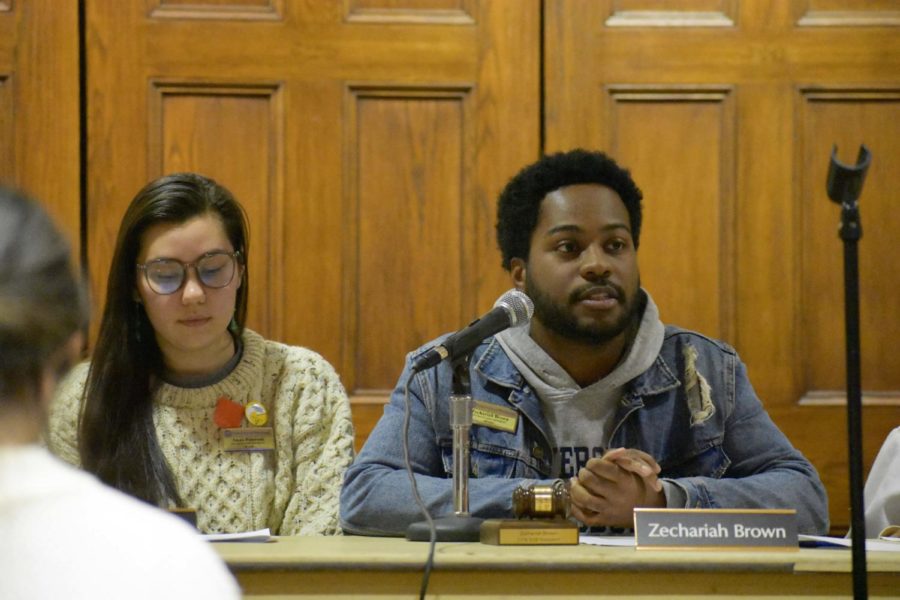Less than 10 students commented on SGB’s SORC proposals
Romita Das | Staff Photographer
SGB proposed three naming solutions for student organizations to choose from, which are available for viewing and comment on its website.
November 13, 2019
Student Government President Zechariah Brown said less than 10 students have voiced input about the board’s proposed ways to resolve the looming problem posed by updated Student Organization Resource Center naming guidelines.
“We haven’t received the volume of student feedback that we were hoping for,” Brown said at Tuesday evening’s SGB meeting. “I’m sure we’re all busy with midterms and projects and such. Which hopefully means students are really satisfied with the options we presented.”
SORC announced in late August that beginning in fall 2020, its registration guidelines would now prohibit the names of independent student organizations from including University trademarks or wordmarks like “Pitt” and “Panther,” instead encouraging clubs to use phrases such as “at Pitt” or “at the University of Pittsburgh.” The changes could affect as many as 393 of the 639 student organizations on campus.
Brown said in early October that his preferred solution is to grandfather current organizations that have been on campus longer than the current naming guidelines have been in effect. All remaining organizations would have to change their names, but would be allowed to sell any merchandise they have already purchased to try and prevent any large financial losses.
SGB proposed three ways to fix the problem at its meeting last Tuesday. The board’s preferred solution is to utilize SORC to approve names and marketing materials for clubs that want to “co-brand” with the University — allowing the use of University trademarks or wordmarks as long as sponsorship is not implied or stated. This model is currently in use at Boston College, the University of Notre Dame and the University of Miami, according to the board.
Two other proposed solutions are to allow independent student organizations to sell their existing merchandise and have the University provide financial assistance to help organizations move into compliance, or grandfather the student organizations created before a less-strict version of the rule was introduced in 2012.
Brown said the board’s proposals are available online and he encouraged students to voice their opinion about which option they think will work the best.
“The point of all of this was to make sure that we had student voices represented and not just a couple of students on a task force, but as many affected student groups as possible,” Brown said.
Brown also provided an update on last week’s announcement that SGB will soon accept grant proposals from student groups for projects aimed at preventing sexual misconduct on campus. He said discussions are still ongoing, but the board hopes to open applications soon. The University announced last month it will make up to $250,000 available to faculty and staff for similar projects.
SGB member Eric Macadangdang proposed the board’s second resolution for this academic year, calling on support for University labor and rights to organize without unlawful intrusion.
The resolution comes about a month after Pitt filed an exception to a ruling proposed by the Pennsylvania Labor Relations Board on Sept. 18, halting its orders. The PLRB’s proposed ruling found the University guilty of three unfair labor practices during the April graduate student union election and ordered a new election.
Macadangdang’s resolution centered on the “rights and well-being” of University students and laborers, supporting the PLRB ruling and calling on the University to retract their exception to the recent ruling.
“The Student Government Board stands in support of fair elections processes for student employees at the University of Pittsburgh free from actions from any party that may interfere,” Macadangdang said.
He added that the board will vote on the resolution at their meeting next Tuesday and its text will be available online in the coming days.
Ravi Gandhi, the chair of SGB’s diversity and inclusion committee, discussed the results of a survey about LGBTQ+ student life on campus. The survey, which saw more than 100 responses, found that about 70% of the respondents see the current resources available for LGBTQ+ students on campus as inadequate.
Gandhi said the Committee is working to figure out what specific resources could be created to fill this need. LGBTQ+ campus leaders have shown support in the past for creating an LGBTQ+ student center.
“We hope to draft a detailed joint proposal or charter demanding specific, tangible resources,” Gandhi said.
Allocations:
The board did not receive any allocations to approve at their meeting Tuesday evening.
Green Fund Advisory Board allocations:
GFAB approved a $225 grant for an Engineers for a Sustainable World project. The grant will pay for pipe insulation, shower heads, window insulation, LED light bulbs, power strips and a door/window insulation.
GFAB approved a $1,002.37 grant for a Plant2Plate project. The grant will pay for a greenhouse, extending the Plant2Plate garden’s season into the winter.
GFAB approved a $52.42 grant for a Plantsburgh native seed-planting workshop. The grant will pay for flower pots, organic potting mix and cat litter, which is used in creating “seed bombs,” small balls of potting soil and native seeds.








